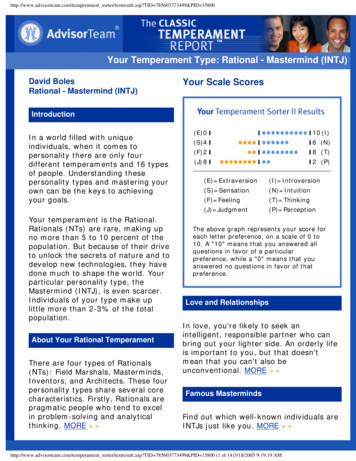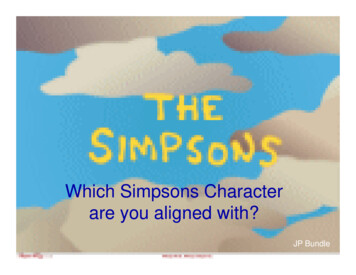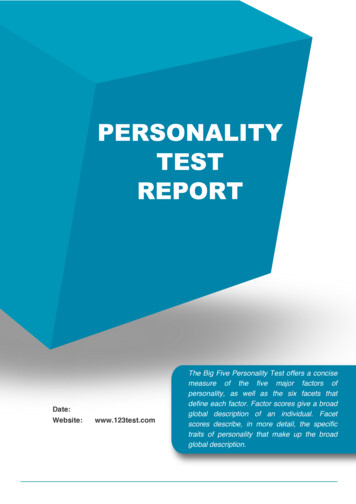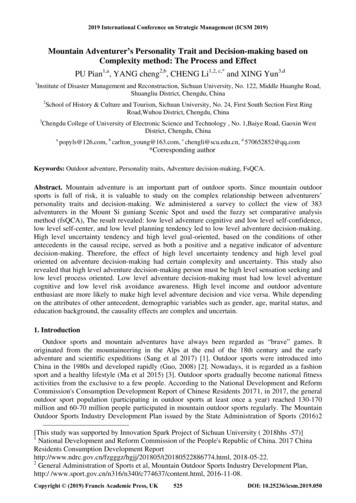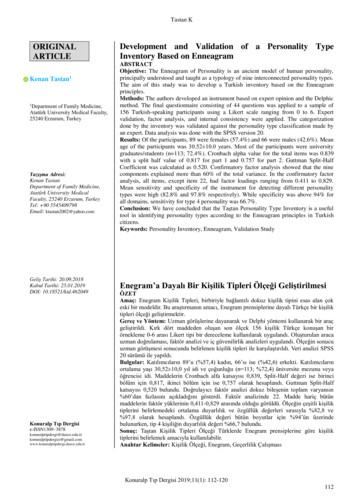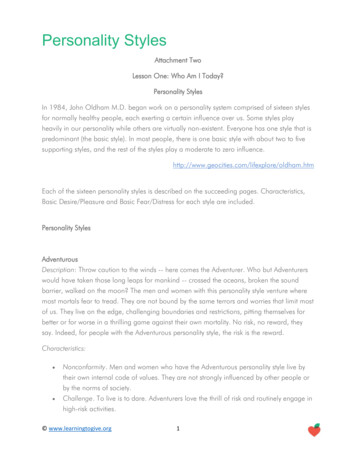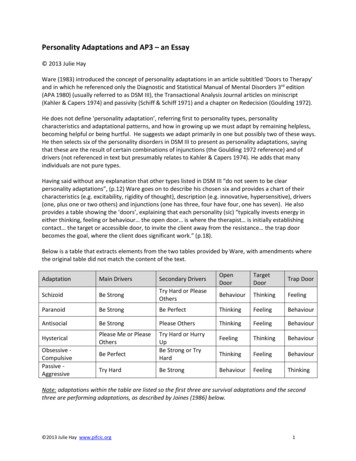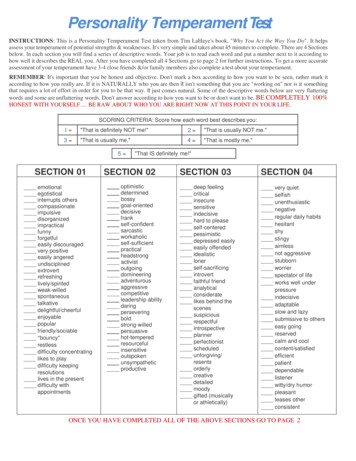
Transcription
Personality Temperament TestINSTRUCTIONS: This is a Personality Temperament Test taken from Tim LaHaye's book, "Why You Act the Way You Do". It helpsassess your temperament of potential strengths & weaknesses. It's very simple and takes about 45 minutes to complete. There are 4 Sectionsbelow. In each section you will find a series of descriptive words. Your job is to read each word and put a number next to it according tohow well it describes the REAL you. After you have completed all 4 Sections go to page 2 for further instructions. To get a more accurateassessment of your temperament have 3-4 close friends &/or family members also complete a test about your temperament.REMEMBER: It's important that you be honest and objective. Don't mark a box according to how you want to be seen, rather mark itaccording to how you really are. If it is NATURALLY who you are then it isn't something that you are "working on" nor is it somethingthat requires a lot of effort in order for you to be that way. It just comes natural. Some of the descriptive words below are very flatteringwords and some are unflattering words. Don't answer according to how you want to be or don't want to be. BE COMPLETELY 100%HONEST WITH YOURSELF . BE RAW ABOUT WHO YOU ARE RIGHT NOW AT THIS POINT IN YOUR LIFE.SCORING CRITERIA: Score how each word best describes you:1 "That is definitely NOT me!"2 "That is usually NOT me."3 "That is usually me."4 "That is mostly me."5 SECTION 01emotionalegotisticalinterrupts lfunnyforgetfuleasily discouragedvery positiveeasily estlessdifficulty concentratinglikes to playdifficulty keepingresolutionslives in the presentdifficulty withappointments"That IS definitely me!"SECTION enturousaggressivecompetitiveleadership atheticproductiveSECTION 03SECTION 04deep feelingcriticalinsecuresensitiveindecisivehard to pleaseself-centeredpessimisticdepressed easilyeasily ithful friendanalyticalconsideratelikes behind ativedetailedmoodygifted (musicallyor athletically)very quietselfishunenthusiasticnegativeregular daily habitshesitantshystingyaimlessnot aggressivestubbornworrierspectator of lifeworks well underpressureindecisiveadaptableslow and lazysubmissive to otherseasy goingreservedcalm and tenerwitty/dry humorpleasantteases otherconsistentONCE YOU HAVE COMPLETED ALL OF THE ABOVE SECTIONS GO TO PAGE 2
Marriage 0Give up0Making 0Concerned0Angry0Joyful0Understanding0Burned 0Unforgiving00Overlook flaws0Growing apartColumn 1 TotalWilling tochangeColumn 2 TotalColumn 3 TotalColumn 4 Total
The Artwork of GodNow that you’ve taken the survey, what does it all mean? Each letter (L,O,G,B)stands for a particular personality type. The column with the highest score is yourdominant personality type, while the column with the second highest number isyour sub-dominant type. While you are a combination of all four personalitytypes, the two types with the highest scores reveal the most accurate picture ofyour natural inclinations, strengths, and weaknesses, and how you will naturallyrespond in most situations.The four personality types can be likened to animals to make them easier tounderstand and remember. On the following pages are the complete descriptionsof each one.
The Artwork of GodL LionsLions are leaders. They are usually the bosses at work .or at least they think they are! They are decisive,bottom line folks who are observers, not watchers or listeners. They love to solve problems. They areusually individualists who love to seek new adventures and opportunities.Lions are very confident and self-reliant. In a group setting, if no one else instantly takes charge, the Lionwill. Unfortunately, if they don’t learn how to tone down their aggressiveness, their natural dominatingtraits can cause problems with others. Most entrepreneurs are strong lions, or at least have a lot of lionin them.Natural StrengthsNatural WeaknessesDecisiveGoal-OrientedAchievement drivenGets ResultsIndependentRisk-takerTakes patientBluntPoor ListenerImpulsiveDemandingMay view projects more important than peopleCan be insensitive to the feelings of othersMay “run over” others who are slower to act or speakFears inactivity, relaxationQuickly bored by routine or mechanicsEnjoys challenges, variety, and changeDriven to complete projects quickly andeffectivelyBasic Disposition: Fast paced, task orientedMotivated by: Results; challenge, action, power, and credit for achievementTime Management: Lions focus on NOW in instead of distant future. They get a lot more done in a lotless time than their peers. Hate wasting time; and like to get right to the point.Communication Style: Great at initiating communication; not good at listening (one-waycommunicator)Decision Making: Impulsive; makes quick decisions with goal or end result in mind. Results-focused.Needs very few facts to make a decision.In Pressure or Tense Situations: The lion takes command and becomes autocratic.Greatest Needs: The lion needs to see results, experience variety, and face new challenges. He needsto solve problems and wants direct results.What the Lion Desires: Freedom, authority, variety, difficult assignments, opportunity foradvancement.
The Artwork of GodO OttersOtters are excitable, fun seeking, cheerleader types who love to talk! They’re great at motivating othersand need to be in an environment where they can talk and have a vote on major decisions. The otters’outgoing nature makes them great networkers – they usually know a lot of people who know a lot ofpeople. They can be very loving and encouraging unless under pressure, when they tend to use theirverbal skills to attack. They have a strong desire to be liked and enjoy being the center of attention. Theyare often very attentive to style, clothes, and flash. Otters are the life of any party; and most peoplereally enjoy being around them.Natural StrengthsNatural WeaknessesEnthusiasticOptimisticGood CommunicatorEmotional and PassionateMotivational and ealisticNot detail-orientedDisorganizedImpulsiveListens to feelings above logicReactiveCan be too talkativeExcitableBasic Disposition: Fast paced. People-oriented.Motivated by: Recognition and approval of others.Time Management: Otters focus on the future and have a tendency to rush to the next exciting thing.Communication Style: Enthusiastic and stimulating, often one-way; but can inspire and motivateothers.Decision Making: Intuitive and fast. Makes lots of “right calls” and lots of wrong ones.In Pressure or Tense Situations: The otter ATTACKS. Can be more concerned about their popularitythan about achieving tangible results.Greatest Needs: The otter needs social activities and recognition; activities that are fun, and freedomfrom details.What the Otter Desires: Prestige, friendly relationships, opportunity to help and motivate others, andopportunities to verbally share their ideas.
The Artwork of GodG Golden RetrieversOne word describes these people: LOYAL. They are so loyal, in fact, that they can absorb the mostemotional pain and punishment in a relationship and still stay committed. They are great listeners,incredibly empathetic and warm encouragers. However, they tend to be such pleasers that they canhave great difficulty being assertive in a situations or relationship when it’s needed.Natural StrengthsNatural WeaknessesPatientEasy-goingTeam accommodatingMay sacrifice results for the sake of harmonySlow to initiateAvoids confrontation even when neededTends to hold grudges and remember hurtsinflicted by othersFears changeSensitive to feelings of othersTremendously loyalPuts people above projectsDependableReliableSupportiveAgreeableBasic Disposition: Slow paced. People-oriented.Motivated by: Desire for good relationships and appreciation of others.Time Management: Golden Retrievers focus on the present and devote lots of time to helping othersand building relationships.Communication Style: Two-way communicator; great listener and provides empathetic response.Decision Making: Makes decisions more slowly, wants input from others, and often yields to the input.In Pressure or Tense Situations: The Golden Retriever needs security; gives in the opinions, ideas,and wishes of others. Often too tolerant.Greatest Needs: The Golden Retriever needs security; gradual change and time to adjust to it; anenvironment free of conflict.What the Golden Retriver Desires: Quality relationships; security; consistent known environment; arelaxed and friendly environment; freedom to work at own pace.
The Artwork of GodB BeaversBeavers have a strong need to do things right and by the book. In fact, they are the kind of people whoactually read the instruction manuals. They are great at providing quality control in an office, and willprovide quality control in any situation or field that demands accuracy, such as accounting, engineering,etc. Because rules, consistency and high standards are so important to beavers, they are oftenfrustrated with others who do not share these same characteristics. Their strong need for maintaininghigh (and oftentimes unrealistic) standards can short-circuit their ability to express warmth in arelationship.Natural StrengthsNatural hnessIndustriousOrderlyMethodical and exhaustiveIntuitiveToo hard on selfToo critical of othersPerfectionistOverly cautiousWon’t make decisions without “all” the factsToo pickyOverly sensitiveControlledBasic Disposition: Slow paced. Task oriented.Motivated by: The desire to be right and maintain quality.Time Management: Beavers tend to work slowly to make sure they are accurate.Communication Style: Beavers are good listeners, communicate details, and are usually diplomatic.Decision Making: Avoids making decisions; needs lots of information before they make a decision.In Pressure or Tense Situations: The beaver tries to avoid pressure or tense situations. They canignore deadlines.Greatest Needs: The beaver needs security, gradual change, and time to adjust to it.What the Beaver Desires: Clearly defined tasks, stability, security, low risk, and tasks that requireprecision and planning.
The Artwork of GodSummary of a Summer Marriage SeasonEmotionsAttitudesActionsClimate of RelationshipHappiness, satisfaction, accomplishments,connection, affection, and feelings of appreciationTrust, genuine commitment to growth, relaxedCommunicating constructively, acceptingdifferences, attending seminars, reading bookstogether, growing spirituallyComfortable, attached, supportive, understanding.In the summer season of marriage, the dreams ofspring have come true. Couples enjoy a great dealof satisfaction from their accomplishments. Theyare resolving conflicts in a positive manner.Having accepted their differences, they areseeking to turn them into assets for theirrelationship. Husbands and wives have a growingsense of togetherness.
The Artwork of GodSummary of a Spring Marriage SeasonEmotionsAttitudesActionsClimate of RelationshipExcitement, joy, hopeAnticipation, optimism, gratitude, love, trustNurturing, planning, communicating, seeking helpwhen neededVital, tender, open, caring.Spring is a time of new beginnings. The flowers ofthe relationship are blooming. The streams ofcommunication are flowing. There is a sense ofexcitement about life together. Couples areexcited about their plans. They have great hopesfor the future. They are planting seeds from whichthey hope to reap a great relationship harvest.
The Artwork of GodSummary of a Fall Marriage SeasonEmotionsAttitudesActionsClimate of RelationshipFear, sadness, dejection, apprehension,discouragement, resentment, feelings of beingunappreciatedConcern, uncertainty, blamingNeglect, failure to face issues, denialDrifting apart, disengaging.In the fall season, couples sense that something ishappening but they’re not sure what. There is asense of detachment. One or both spouses beginto feel neglected. Couples realize there are someissues they are not facing squarely. It seems thatthey are disengaging emotionally, and each tendsto blame the other. If they have lived in the fallseason for a while, their friends and family may berecognizing the changes – and be silentlyconcerned.
The Artwork of GodSummary of a Winter Marriage SeasonEmotionsAttitudesActionsClimate of RelationshipHurt, anger, disappointment, loneliness, feelingrejectedNegativity, discouragement, frustration,hopelessnessDestructive, speaking harshly, not speaking,violent, controlling, passive aggressive, abusiveDetached, cold, harsh, bitter.In the winter season of marriage, couples areunwilling to negotiate differences. Conversationsturn to arguments, or spouses withdraw insilence. There is no sense of togetherness. Themarriage is like two people living in separateigloos – a freezing cold environment with little tono positive interactions. All interactive outcomesturn negative.
: This is a Personality Temperament Test taken from Tim LaHaye's book, "Why You Act the Way You Do". It helps assess your temperament of potential strengths & weaknesses. It's very simple and takes about 45 minutes to complete. There are 4 Sections below. In
